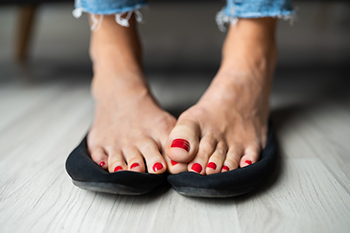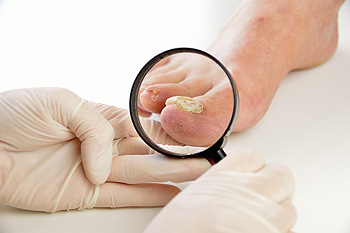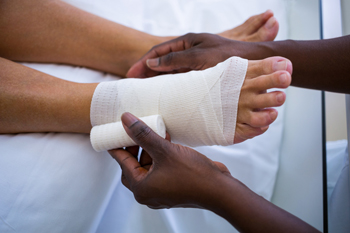December 2021
Medications for Fungal Toenail Infections
Toenail fungus is extremely common, affecting about 5.5% of adults around the world. This condition can cause the toenails to become brittle, crumbly, discolored, or misshapen. In severe cases, the nails may even begin to separate from the nail bed and emit a foul odor. Treating fungal toenails can be difficult, as it can take a long time before there are visible results. There are various treatment options available, including topical medications that are applied directly to the nail, oral medications that are taken by mouth, and laser treatment. Currently, many podiatrists prescribe a combination of oral and topical treatments. While these medications can be effective, oral medications may cause unwanted side effects, and topical medications are not as effective for severe infections. If you have toenail fungus, it is suggested that you are under the care of a podiatrist.
If left untreated, toenail fungus may spread to other toenails, skin, or even fingernails. If you suspect you have toenail fungus it is important to seek treatment right away. For more information about treatment, contact Dawn Miles, DPM of Florida. Our doctor can provide the care you need to keep you pain-free and on your feet.
Symptoms
- Warped or oddly shaped nails
- Yellowish nails
- Loose/separated nail
- Buildup of bits and pieces of nail fragments under the nail
- Brittle, broken, thickened nail
Treatment
If self-care strategies and over-the-counter medications does not help your fungus, your podiatrist may give you a prescription drug instead. Even if you find relief from your toenail fungus symptoms, you may experience a repeat infection in the future.
Prevention
In order to prevent getting toenail fungus in the future, you should always make sure to wash your feet with soap and water. After washing, it is important to dry your feet thoroughly especially in between the toes. When trimming your toenails, be sure to trim straight across instead of in a rounded shape. It is crucial not to cover up discolored nails with nail polish because that will prevent your nail from being able to “breathe”.
In some cases, surgical procedure may be needed to remove the toenail fungus. Consult with your podiatrist about the best treatment options for your case of toenail fungus.
If you have any questions, please feel free to contact one of our offices located in Palatka and Saint Augustine, FL . We offer the newest diagnostic and treatment technologies for all your foot care needs.
Ways Seniors Can Avoid Falling at Home
More than one in three people age 65 and older fall each year. Many factors that can lead to a fall at home, and some of the most common are muscle weakness, loose throw rugs on the floor, numbness in the feet, and unsafe footwear, such as backless shoes and high heels. With a few preventative measures implemented, you can reduce the chances of falling and maintain an active life as a senior. Staying physically active is especially important as one ages. Regular exercise improves muscle strength and can help keep your joints, tendons, and ligaments flexible. Stand up slowly after lying down or sitting for a prolonged period of time. Use a cane or walker as needed to aid in balance. Wear shoes or slippers with non-skid soles that fully support the feet. If you feel that you have an increased risk for falls, or are planning a new exercise regime, please consult a podiatrist for more information on prevention and various treatment options.
Preventing falls among the elderly is very important. If you are older and have fallen or fear that you are prone to falling, consult with Dawn Miles, DPM from Florida. Our doctor will assess your condition and provide you with quality advice and care.
Every 11 seconds, an elderly American is being treated in an emergency room for a fall related injury. Falls are the leading cause of head and hip injuries for those 65 and older. Due to decreases in strength, balance, senses, and lack of awareness, elderly persons are very susceptible to falling. Thankfully, there are a number of things older persons can do to prevent falls.
How to Prevent Falls
Some effective methods that older persons can do to prevent falls include:
- Enrolling in strength and balance exercise program to increase balance and strength
- Periodically having your sight and hearing checked
- Discuss any medications you have with a doctor to see if it increases the risk of falling
- Clearing the house of falling hazards and installing devices like grab bars and railings
- Utilizing a walker or cane
- Wearing shoes that provide good support and cushioning
- Talking to family members about falling and increasing awareness
Falling can be a traumatic and embarrassing experience for elderly persons; this can make them less willing to leave the house, and less willing to talk to someone about their fears of falling. Doing such things, however, will increase the likelihood of tripping or losing one’s balance. Knowing the causes of falling and how to prevent them is the best way to mitigate the risk of serious injury.
If you have any questions, please feel free to contact one of our offices located in Palatka and Saint Augustine, FL . We offer the newest diagnostic and treatment technologies for all your foot care needs.
When the Wound on Your Foot Becomes an Ulcer
Wounds can occur on the feet from an injury, poor circulation, prolonged pressure from improperly fitted shoes, or complications from diseases like diabetes, neuropathy, and vascular disease. Over time, if these wounds do not close and the underlying tissue becomes affected, they are considered ulcers. These types of wounds are potentially dangerous – particularly in people with diabetes. Ulcers can lead to infections in the bone and skin. You can sometimes tell if the wound on your foot has become an ulcer if it is draining, emits a foul odor, or the tissue has become thickened, inflamed, or red. It is important to seek the professional wound care that a podiatrist can provide to help heal the wound and prevent more serious complications from developing. Podiatrists typically begin by cleaning the wound and removing any unhealthy tissue, termed debridement. Antibiotics may be prescribed if an infection is present. They may also suggest certain shoes and orthotics that will keep pressure off the wound and, in severe cases, perform surgery and other methods of wound care.
Wound care is an important part in dealing with diabetes. If you have diabetes and a foot wound or would like more information about wound care for diabetics, consult with Dawn Miles, DPM from Florida. Our doctor will assess your condition and provide you with quality foot and ankle treatment.
What Is Wound Care?
Wound care is the practice of taking proper care of a wound. This can range from the smallest to the largest of wounds. While everyone can benefit from proper wound care, it is much more important for diabetics. Diabetics often suffer from poor blood circulation which causes wounds to heal much slower than they would in a non-diabetic.
What Is the Importance of Wound Care?
While it may not seem apparent with small ulcers on the foot, for diabetics, any size ulcer can become infected. Diabetics often also suffer from neuropathy, or nerve loss. This means they might not even feel when they have an ulcer on their foot. If the wound becomes severely infected, amputation may be necessary. Therefore, it is of the upmost importance to properly care for any and all foot wounds.
How to Care for Wounds
The best way to care for foot wounds is to prevent them. For diabetics, this means daily inspections of the feet for any signs of abnormalities or ulcers. It is also recommended to see a podiatrist several times a year for a foot inspection. If you do have an ulcer, run the wound under water to clear dirt from the wound; then apply antibiotic ointment to the wound and cover with a bandage. Bandages should be changed daily and keeping pressure off the wound is smart. It is advised to see a podiatrist, who can keep an eye on it.
If you have any questions, please feel free to contact one of our offices located in Palatka and Saint Augustine, FL . We offer the newest diagnostic and treatment technologies for all your foot care needs.
Wounds That Don't Heal Need to Be Checked
Preventing Sweaty Feet
 Plantar hyperhidrosis is a medical condition that can cause excessive sweating in the feet. This problem can not only be uncomfortable and embarrassing, but also a contributing factor to other foot problems, such as fungal infections of the skin and toenails. Plantar hyperhidrosis is best treated by a professional, however there are some steps that you can take to reduce foot sweating in your day to day life. These include wearing socks that wick moisture away from your feet, wearing shoes made of breathable materials, and maintaining good foot hygiene. Over-the-counter antiperspirants and antifungal powders can also be helpful. If you suffer from excessively sweaty feet, don’t hesitate to schedule an appointment with a podiatrist near you.
Plantar hyperhidrosis is a medical condition that can cause excessive sweating in the feet. This problem can not only be uncomfortable and embarrassing, but also a contributing factor to other foot problems, such as fungal infections of the skin and toenails. Plantar hyperhidrosis is best treated by a professional, however there are some steps that you can take to reduce foot sweating in your day to day life. These include wearing socks that wick moisture away from your feet, wearing shoes made of breathable materials, and maintaining good foot hygiene. Over-the-counter antiperspirants and antifungal powders can also be helpful. If you suffer from excessively sweaty feet, don’t hesitate to schedule an appointment with a podiatrist near you.
If you are suffering from hyperhidrosis contact Dawn Miles, DPM of Florida. Our doctor can provide the care you need to attend to all of your foot and ankle needs.
Hyperhidrosis of the Feet
Hyperhidrosis is a rare disorder that can cause people to have excessive sweating of their feet. This can usually occur all on its own without rigorous activity involved. People who suffer from hyperhidrosis may also experience sweaty palms.
Although it is said that sweating is a healthy process meant to cool down the body temperature and to maintain a proper internal temperature, hyperhidrosis may prove to be a huge hindrance on a person’s everyday life.
Plantar hyperhidrosis is considered to be the main form of hyperhidrosis. Secondary hyperhidrosis can refer to sweating that occurs in areas other than the feet or hands and armpits. Often this may be a sign of it being related to another medical condition such as menopause, hyperthyroidism and even Parkinson’s disease.
In order to alleviate this condition, it is important to see your doctor so that they may prescribe the necessary medications so that you can begin to live a normal life again. If this is left untreated, it is said that it will persist throughout an individual’s life.
A last resort approach would be surgery, but it is best to speak with your doctor to find out what may be the best treatment for you.
If you have any questions please feel free to contact one of our offices located in Palatka and Saint Augustine, FL . We offer the newest diagnostic and treatment technologies for all your foot and ankle needs.













